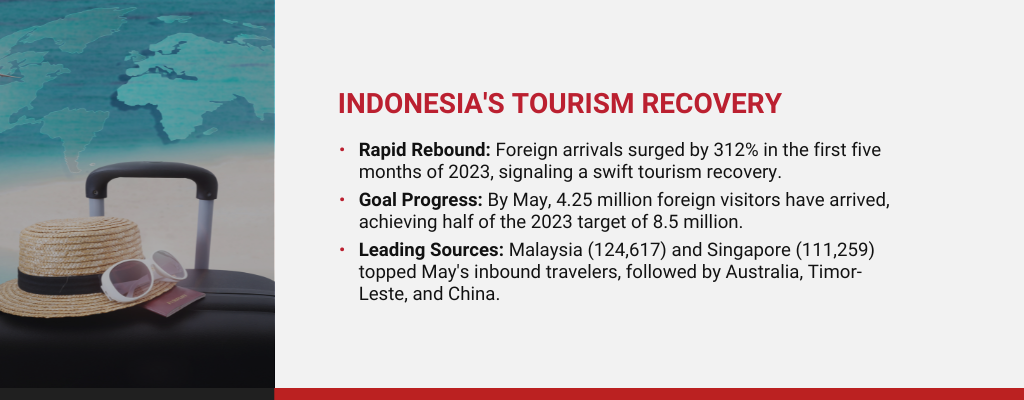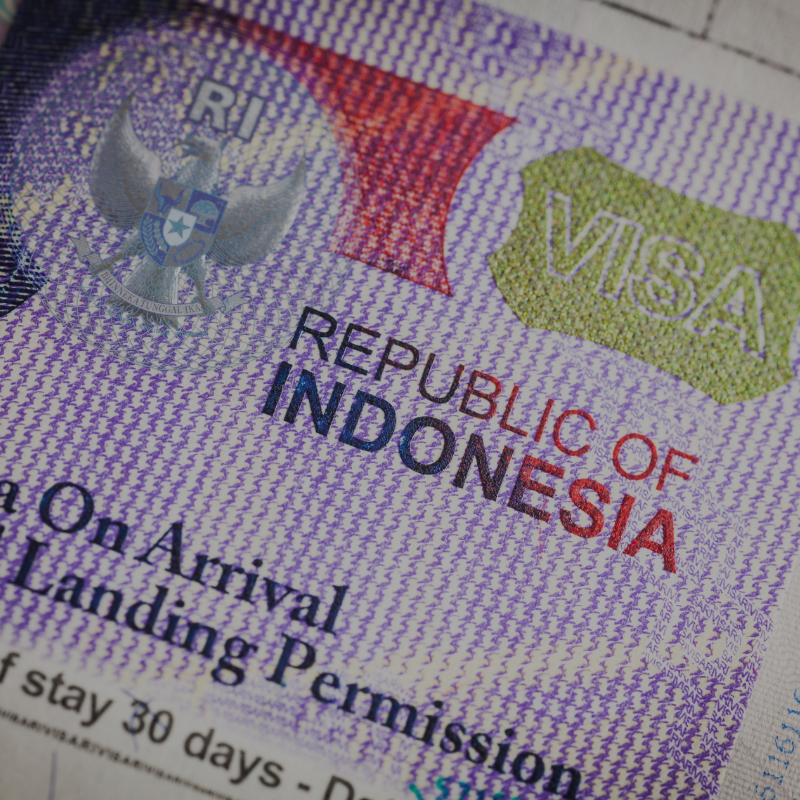Embarking on an Indonesian adventure is a dream for many. Mastering the Indonesia tourist visa process is vital to making it a reality. In this guide, we’ll simplify the steps to applying for an Indonesia tourist visa, ensuring your journey is smooth and unforgettable.
Why is Indonesia popular as a tourist destination?

Indonesia’s tourism industry is experiencing a rapid recovery, with a 312% increase in foreign arrivals in the first five months of 2023 compared to the previous year.
Minister of Tourism and Creative Economy Sandiaga Uno stated that Indonesia is on track to achieve its goal of tourist arrivals. As of May, the number of foreign visitors has reached 4.25 million, or 50% of 2023’s target of 8.5 million.
Statistics Indonesia’s data (BPS) depict Malaysia as the most significant contributor for inbound travelers in May with 124,617, followed by Singapore with 111,259, and then by Australia, Timor-Leste, and China.
Previously, the COVID-19 pandemic caused significant losses to the tourism industry. The number of foreign arrivals only achieved an estimated 11 million in 2020 and 2022, significantly lower compared to 2019 alone with 16 million.
3 common types of tourist visas
If you are considering a holiday in Indonesia, you should apply for an Indonesian tourist visa. This visa enables you to enjoy a 30-day stay in the country, and it can be renewed multiple times, allowing for a total stay of up to 6 months.
It’s important to understand that any visit visa in Indonesia does not grant employment or income generation permission. You will need a business visa, an Indonesian work permit, or a KITAS to engage in work activities. The types of tourist visas available are:
1. Single Entry Visa (Index B211A)
The visa allows for a single entry with a maximum of 60 days from your initial arrival date, regardless of when you arrive. For instance, arriving at 11:30 PM or 23:30 is considered Day 1.
For those with a Visa B211A, the stay in Indonesia can be extended up to 4 times, each for 30 days. To extend your visa, you must apply at the nearest Immigration Office in Indonesia no later than seven days before your permitted stay duration expires.
2. Multiple Entry Visa (Index 212)
The visa enables multiple entries into Indonesia and remains valid for up to one year from the issuance date, permitting stays of at most 60 days per visit.
This visa category is designed for individuals who must make multiple trips to Indonesia for official government duties, business endeavors, commercial engagements, or family visits.
It’s important to note that this visa cannot be used for work purposes or transformed into any other form of residency permit. Obtaining this type of visa necessitates obtaining a Visa Authorization from Indonesia’s Directorate General of Immigration.
3. Visa on Arrival (VoA)
Holders of passports issued by 92 countries can acquire a Visa on Arrival (VoA) upon their arrival in Indonesia at designated airports, seaports, or land border checkpoints.
The VoA permits a stay of up to 30 days from the first day of arrival, regardless of the arrival time. The issuance of a VoA is at the discretion of the Immigration Officer at the arrival point.
The possibility of extending the VoA for an additional 30 days rests with the Indonesian Immigration Office and is subject to their discretion. Travelers seeking an extension are advised to contact the local Immigration Office in Indonesia closest to them.
Please be aware that a VoA cannot be transformed into any other visa or residency permit category within Indonesia.
Read more: Start your medical tourism business in Bali
Updates on visa policies
Some COVID-19 control and economic recovery policies, including visa grants and stay permits, have been revoked, according to the latest Minister of Law and Human Rights Regulation No. 19/2023. Some of the updates include:
1. Revocation of an onshore visa application
Onshore visa applications for B211, C312, C312, C314, and C317, including Single Entry Tourist and Business Visas, Working Visas, Investor Visas, and Family Visas, are no longer available.
Visa applicants cannot remain in Indonesia when applying for a new visa. Applicants must leave Indonesia and apply for their visa outside the country. This change will not affect stay permit holders intending to renew their ITAS.
2. Visa health regulation
COVID-19 vaccination certificate, compliance statement with the Indonesian health protocol, personal health treatment coverage, and COVID-19 insurance are no longer mandatory.
3. Visa exemption for non-ASEAN countries
The current status of the visa exemption policy for countries outside the ASEAN region needs to be updated, necessitating citizens of non-ASEAN countries to acquire a visa before entering.
How to apply for an Indonesian tourist visa
When applying for an Indonesian tourist visa, you will need several supporting documents for your visa application. These include
| No | Documents | Descriptions |
|---|---|---|
| 1. | Indonesia Visa Application Form | The form is available on the Embassy/Consulate’s respective websites or in their offices. You need to complete and sign it. |
| 2. | A valid passport and copy | The passport should have a minimum validity of six months and be valid for at least six months beyond your intended entry into Indonesia. |
| 3. | A copy of a valid Residence Permit/Visa | It is necessary if you are not a citizen of the country you live in. |
| 4. | The passport-size picture | Follow the requirements. |
| 5. | A copy of the travel ticket | A copy for your return journey or your next destination after Indonesia. |
| 6. | Bank statement | Evidence of having sufficient finance to cover your expenses. |
| 7. | Letter of invitation (family/friends) | If you visit friends or family in Indonesia, a letter of invitation from them and a copy of their ID card or passport are necessary. |
| 8. | Letter of invitation | For an organization or institution. |
| 9. | Payment proof | Evidence of payment for the Indonesia visa fee. |
| 10. | Letter of Visa Authorization | If you apply for a Multiple-Entry Visa, your sponsor in Indonesia needs to obtain it on your behalf from the Directorate General of Immigration in Indonesia. |
Conclusion
Indonesia’s tourism industry has experienced significant recovery following the end of the COVID-19 pandemic status in Indonesia. With the government’s ambitious target of foreign arrivals of 8.5 million in 2023, requirements related to COVID-19 certificates have also been relaxed to ease tourist arrivals to the country.
Suppose you are considering spending your vacation in Indonesia. In that case, you may seek InCorp Indonesia’s assistance to facilitate your visa application process, primarily related to tourist visas.
Contact our experts to learn how to obtain a tourist visa seamlessly by clicking the button below.
Get in touch with us.
What you'll get
A prompt response to your inquiry
Knowledge for doing business from local experts
Ongoing support for your business
Disclaimer
The information is provided by PT. Cekindo Business International (“InCorp Indonesia/ we”) for general purpose only and we make no representations or warranties of any kind.
We do not act as an authorized government or non-government provider for official documents and services, which is issued by the Government of the Republic of Indonesia or its appointed officials. We do not promote any official government document or services of the Government of the Republic of Indonesia, including but not limited to, business identifiers, health and welfare assistance programs and benefits, unclaimed tax rebate, electronic travel visa and authorization, passports in this website.



